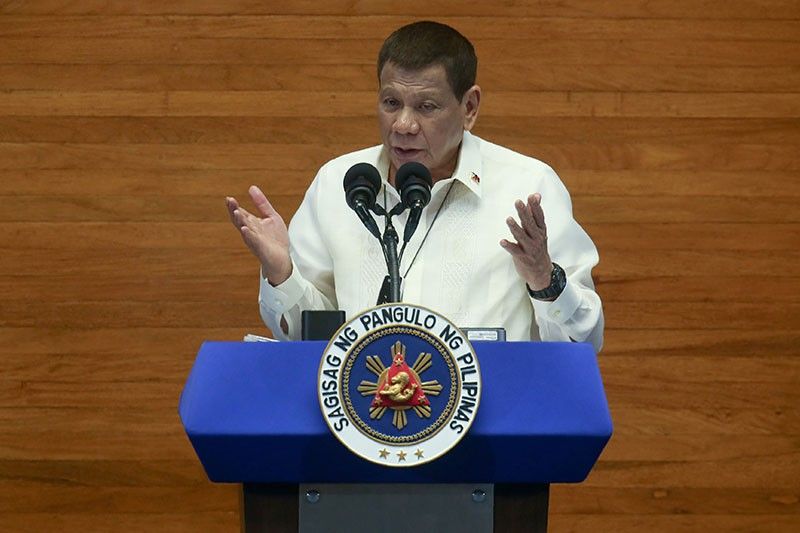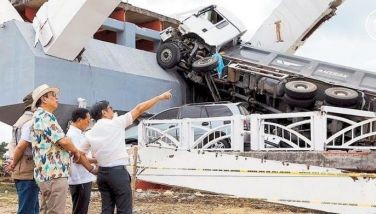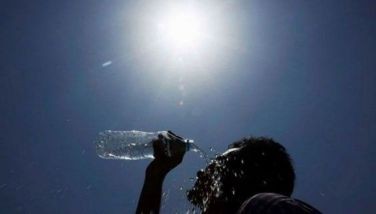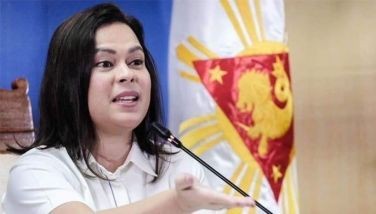Duterte says government 'will not dodge' human rights obligations

MANILA, Philippines (Updated 8:19 p.m.) — The Philippine government will not evade its obligations to uphold human rights, President Rodrigo Duterte said Monday despite his and other officials being candid about their disdain for rights workers and monitors.
Those monitors have documented cases of the violation or suppression of human rights and civil liberties.
Duterte took the podium to deliver his fifth and penultimate State of the Nation Address, addressing a public affected by the coronavirus pandemic.
“My administration always believed that freedom from illegal drugs, terrorism, corruption and criminality is itself a human right violation,” the president said, asserting that freedom from those threats is a right.
Duterte said the protection of the rights of children and rights against discrimination is part of the government’s efforts to uphold human rights.
“Rest assured we will not dodge obligation to fight for human rights,” the chief executive said.
In third SONA in 2018, Duterte said his concern was not human rights, but the lives of people amid thousands of extrajudicial killings in his war on drugs.
"Your concern is human rights, mine is human lives. The lives of our youth are being wasted and families are destroyed, and all because of the chemicals called shabu, cocaine, cannabis, and heroine," he said then.
'Grave human rights violations'
But the Duterte administration, elected on a campaign promise of a ruthless anti-narcotics and anti-crime platform, has been widely criticized for its brutal "war on drugs" that has killed thousands of alleged drug personalities, more than 5,000 of which the government has acknowledged and has said were caused by "drug personalities" shooting it out with law enforcement.
In a report presented to the United Nations Human Rights Council during its 44th session last month, United Nations rights chief Michelle Bachelet said the government’s anti-narcotics campaign has resulted in serious human rights violations, including “widespread and systematic” extrajudicial killings.
Non-governmental organizations World Organisation Against Torture and Children’s Legal Rights and Development Center documented that at least 122 children have been killed in Duterte’s drug war.
The environment for human rights defenders has also become increasingly hostile under the administration of Duterte.
The Commission on Human Rights, in a report released early this month, said there is a “systematic attack” against rights defenders across all sectors of civil society, with at least 104 human rights defenders reportedly killed since Duterte assumed presidency. The CHR said the legitimization of violence against rights workers was made possible by the chief executive.
Early this month, Duterte signed the contentious anti-terrorism bill into law. The legislation is feared to infringe on people’s fundamental rights and be used as a tool to go after dissenters and members of opposition.
The law is facing at least 19 legal challenges at the Supreme Court.
‘Hollow’ promise
For rights group Karapatan, Duterte’s promise to protect human rights is as “hollow” as his vow for change.
“Human and people’s rights should be respected, protected and realized in the daily lives of people—and these are not being done under your administration. You spit on, trample upon and deride the recognition of even the most basic of rights: the right to live, with dignity,” Cristina Palabay, Karapatan secretary-general, said in a statement.
Minutes after Duterte declared he would uphold human rights, he asked Congress to reinstate the death penalty through legal injection for drug-related offenses.
“If indeed you do not evade your human rights obligations, why opt out of the Rome Statute when investigation on your alleged crimes against humanity was initiated?" Palabay said.
"Why do you continue to malign and undermine United Nations Special Procedures who seek to visit and investigate the rights violations in the Philippines? Why did you not allow United Nations High Commissioner Bachelet to come in the country to directly talk to victims?"
- Latest
- Trending






























